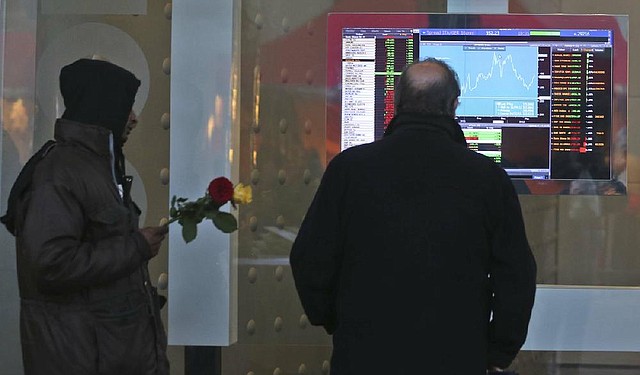Italian premier pledges to lead
Monti: Early resignation won’t leave ‘decision-making vacuum’
A man in Milan, Italy, checks the Italian stock exchange Monday as the country’s stock market fell and Italy saw its borrowing costs jump as investors and European leaders worried about Prime Minister Mario Monti’s decision to resign earlier than expected.
Tuesday, December 11, 2012
ROME — Seeking to calm financial markets, Prime Minister Mario Monti said Monday he will lead Italy until the next government takes power, insisting there will be “no decision-making vacuum” despite his intention to resign ahead of time.
Uncertainty over what will happen after the election, however, kept markets on edge, sending stocks and bonds plunging.
Monti announced Saturday he is resigning early because former Prime Minister Silvio Berlusconi’s party, Parliament’s largest, yanked its support for his economic policies. The same day, Berlusconi said he was running to get the premiership back, despite his party’s lag in the opinion polls.
Italian markets slumped as investors feared a new era of political instability.
And the prospect of a return to a shaky government and finances put new strains on the leaders of the 17 European Union countries that use the euro and their efforts to bottle up the region’s debt and economic crisis.
Since taking office in November 2011 — after markets lost confidence in Berlusconi’s attempts at reform — Monti’s 13-month old government has managed to lower Italy’s borrowing costs in the bond markets — albeit with help from the European Central Bank and its offer to buy short-term debt. His unelected cabinet of experts expected to have until elections scheduled for April to implement reforms.
On Monday, Italy’s borrowing costs started to rise again as investors worried over who would keep the country on the path to recovery. The interest rate on Italy’s 10-year bonds, a key indicator of the debt crisis, jumped to 4.75 percent. Last week they yielded only 4.4 percent — down from over 7 percent at the start of 2012.
At one point during the day, Italian stocks slumped more than 3 percent. Led by plunging bank shares, Italy’s main stock index, the FTSE MIB, closed 2.2 percent lower.
“The uncertainty is significant, not just how the election will pan out, but how the government will turn out and what the debate is going to be like,” said analyst Raoul Ruparel at the Open Europe think tank in London. From Oslo, Norway, where he was attending the Nobel Peace Prize award to the EU, Monti said Monday that the financial market drops in Italy “shouldn’t be dramatized.”
He also said he is ‘’fully confident” that the next government will be “highly responsible” and “in line” with policies needed for the good of Italy’s economy and the European Union in a wider context.
He will step down as soon as Parliament passes the 2013 budget law later this month. His term was due to end by April, and his resignation would move up elections by about two months.
While the higher bond rate is manageable, and still well below the 6.4 percent high it hit in July, the daily sharp rise was worrisome.
“The markets must not fear a decision-making vacuum,” Monti said, noting that the government will continue to run the country even after the Parliament is dissolved ahead of the new elections. ‘’The government is in charge [of] all its powers,” he said.
The risk from Saturday’s announcement is that heavily indebted Italy, the eurozone’s third-largest economy after Germany and France, will now slow down or halt efforts to shake up its economy. The country’s debt stands at 126 percent of its annual gross domestic product of $2.1 trillion.
After passing a 2013 budget, the Italian Parliament will likely pass little in the way of new measures for several months. And Italy could come out of new elections — expected in February — with no party clearly in control.
Asked if he would run in the elections, Monti indicated he was not planning to seek any office, saying he didn’t want any electoral campaign to distract him from his government’s task of restoring Italy’s finances and economy to health.
The Italian election campaign is expected to put the EU’s budget policy up for review in the 27-country area’s fourth-largest economy.
Explaining his decision to leave before his term was up, Monti said it would have been impossible to continue after Berlusconi’s forces withdrew support for his economic policies. His government had been endorsed by the two largest political parties, including Berlusconi’s.
In ending his support for Monti’s measures, Berlusconi contended that the government’s recipe for severe austerity is doing nothing to lift Italy out of recession.
Without Monti in the race, the strongest candidate in opinion polls has been centerleft leader Pier Luigi Bersani. Although Bersani staunchly backs the Monti government, left-wing lawmakers have been wary about labor market reform plans.
Leaders of small centrist parties in Italy have been wooing Monti to come onto their ticket. Although Monti has ruled out running for office, he indicated he might accept some role in government if asked.
European leaders, who collectively sighed in relief when Monti was appointed, did not hide their concern over news of his departure and that Berlusconi, with his personal scandals and legal woes, was back in the political fray.
“The 2013 Italian election remains high on our list of tail risks,” Holger Schmieding, chief economist at Berenberg Bank AG in London, wrote Monday. “A Berlusconi campaign against ‘German austerity’ could potentially unsettle markets.”
Italy faces about two months of campaigning as Berlusconi, 76, seeks to appeal to an electorate weary of tax increases and recession.
Information for this report was contributed by Frances D’Emilio, Nicole Winÿeld, David McHugh and Geir Moulson of the Associated Press, and Andrew Frye, Josiane Kremer, Jonas Bergman, Rainer Buergin, Lukanyo Mnyanda, Lorenzo Totaro, Chiara Vasarri and Andrew Davis of Bloomberg News.
Business, Pages 23 on 12/11/2012
